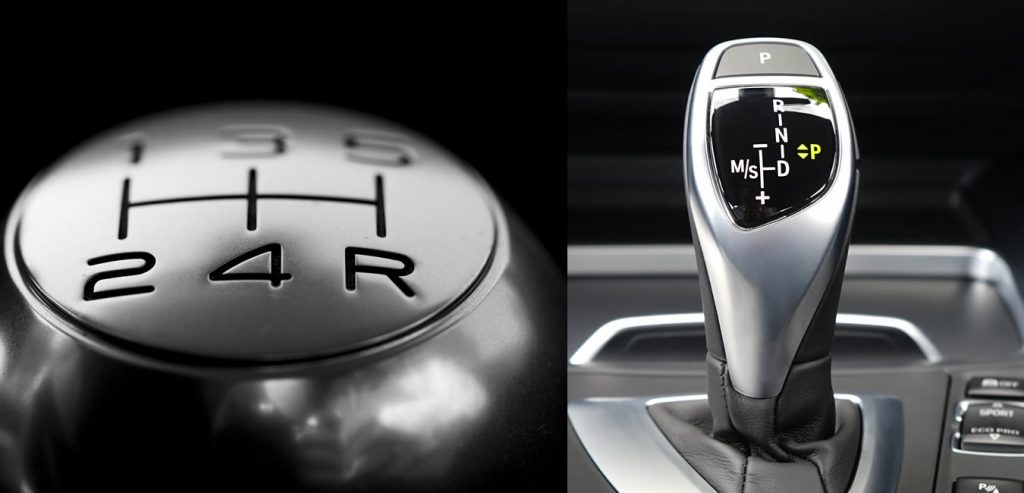The Pros and Cons of Manual vs Automatic Cars

Published 30 August 2019
Should you get a manual or automatic car? Well in this article we will go through the pros and cons of each and give you all the information you need to make the right choice for you.
Before we launch into the pros and cons let’s just clarify the difference between manual and automatic transmission.
What’s the difference between manual and automatic transmission?
The majority of vehicles driven in the UK are manual. Manual transmission requires you to select the correct gear while pressing down the clutch pedal. You have to change the gear manually throughout your journey, appropriate for the speed and road conditions. Manual transmission cars usually have 5-6 gears and reverse.
Automatic cars do not have a clutch pedal, and have a simplified gearbox. Automatics have the following settings: Park – P, Reverse – R, Neutral – N and Drive – D. As the name automatic suggests it selects the right type of gear for you automatically in relation to the speed you are travelling.
Today there are a number of different types of automatic transmission, but for this article we are basing it on the traditional automatic gearbox.
Pros of manual transmission
Driving a manual car gives you complete control over the car as you choose what gear you want. This greater control can be particularly beneficial in difficult driving conditions. Having manual control is also necessary when towing or off-roading and you need to maintain a low gear.

A manual gearbox is traditionally better at transferring power from your engine to your wheels, so you can accelerate faster.
Manual cars tend to be cheaper to buy and maintain than automatics. Manuals generally require less maintenance because they have a less complex design than automatics.
Plus for some drivers, it just feels ‘right’ to change gears yourself. Some habits are hard to break, and there’s a certain level of satisfaction to be had when shifting gears.
Cons of manual transmission
A manual requires more effort than an automatic which becomes most apparent in heavy traffic. Driving in congested areas means your left foot gets overworked operating the clutch and can lead to aches and pains in the leg and the foot.
Learning to drive in a manual is more complicated than an automatic, having to master the gears and clutch control. Some learners therefore opt to take their driving test in an automatic vehicle.
Manual cars can be considered less safe than automatics because you have to take one hand off the steering wheel to change gears.
Pros of automatic transmission
An automatic is easier to drive as there is no need to press a clutch or find the right gear. Just select D for Drive and forget about the gear stick until you need to park or reverse.

Driving in slow congested traffic is made easier with an automatic as you don’t have the chore of constantly using the clutch pedal or changing gears up and down.
Automatics allow you to concentrate fully on navigating safely, as you are not having to think what gear you need or taking your hand off the wheel to change gear.
You get a much smoother ride with an automatic as gear transitions are judder-free.
Cons of automatic transmission
The main disadvantage of automatics is that they generally cost more to buy than their manual counterparts, both new and second-hand, so they’re not ideal if you’re on a budget.
Some drivers find that automatics take the fun out of driving. They like the feel of changing gear and having more of a physical connection with their car. And for anyone used to changing gears, it can actually be difficult to adjust to not having a clutch.
Although most automatic gearboxes allow you to ‘kick down’ – press the accelerator briefly and firmly to tell the gearbox to change down – and some offer the option of selecting gears with buttons or paddles, automatics are generally not considered as responsive as manuals.
Although an automatic transmission is less likely to go wrong than a manual gearbox, when it does it is more expensive to repair.
Are manual cars more fuel efficient than automatics?
People generally assume that automatic cars use more fuel than manuals. That did used to be the case, with older models. Automatic technology has hugely improved in recent years and in many cases, you may even find that you’ll get more miles to the gallon in an automatic. So there isn’t a simple answer to this one and it’s always best to check the mpg .
Is it easier to learn to drive in an automatic car?
Mastering clutch and gears can take a lot of practice to master, but does become second nature. An automatic car makes it easier to focus more on speed and road position, so you can focus on learning how to handle the car rather than worrying about gear changes.
Stalling is a common problem when trying to master a manual, especially on hill starts or setting off at traffic lights. Stalling an automatic transmission will only occur if there’s a mechanical issue.
If I learn in an automatic can I drive a manual?
If you take your test in an automatic car your driving license will only allow you to drive an automatic on public roads. If you want to drive a manual you will have to retake your test in a manual car.
If you’re licensed to drive a manual car in the UK, you’re also allowed to drive an automatic vehicle on public roads.
Are manual cars cheaper to insure?
Automatic cars are more expensive to insure compared with manual cars, although the difference can be small. The additional expense is because automatic gearboxes are more costly to repair or replace than manuals.
If your driving license is for automatic cars only then your insurance premiums are usually considerably higher than for a driver with a full licence.
Conclusion
Whether you go for a manual or an automatic is a highly personal decision and there are an equal amount of pros and cons for each.
If you spend a lot of time commuting in congested traffic you may prefer an automatic to make the commute more bearable.
If you learnt how to drive in a manual you could find a switch to an automatic feels strange, like something is missing. Not changing gear does feel odd if you are used to it, and can make driving feel a bit boring.
Budget is definitely a consideration as automatics are more expensive to buy, maintain and insure than manuals.
Compass Vehicle Services Ltd offer: nationwide car leasing – bad credit car finance – used car deals – personal leasing – business car leasing – best car lease deals – non-status car leasing
Back to all help and advice articles



